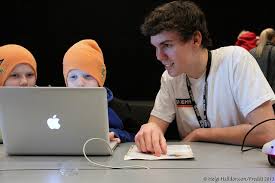Tecnicista school: Proposal consists of: planning and rational organization of the pedagogical activity; operacionalizao of the objectives; parcelamento of the work, with specialization of the functions; education for computer, tele education, looking for to become the learning most objective. Construtivistas theories: Piaget? according to it, to the measure that the influence of the way modifies the balance, the intelligence, that exerts adaptativa function par excellence, reestablishes the auto regulation. Vygotsky – When analyzing the phenomena of the language and the thought, search to inside understand them of the process partner-description as ‘ ‘ internalizao of the activities socially taken root and historically desenvolvidas’ ‘. Therefore, the relation between the citizen that knows and the world known is not direct, but it becomes for mediation of the symbolic systems. Consideraes Final the Education of century XX in this historical context, the educators of the new school introduces the democratic liberal thought, defending the public school for all, in order to reach a igualitria society without privileges. We can say that Pablo Freire is one of the great pedagogos of the present time, not only in Brazil, but also in the world. It is based on a theology liberator, worried about the contrast between the poverty and the wealth that results in privileges.
In its workmanship ‘ ‘ Pedagogia of the Oprimido’ ‘ it makes a boarding dialectic of the reality, whose determinative if they find in the economic factors, social politicians and. It considers that knowing it cannot be an act of ‘ ‘ doao’ ‘ of the educator to educating, but a process that if establishes in the contact of the man with the lived world. this is not static, but dynamic, in continuous transformation. In the authentic education, the relation vertical between educator and educating and restored the dialgica relation is surpassed. Pablo Freire defends the pedagogical self management, the professor is an entertainer of the process, preventing the authoritarianism forms that costumam to mine the pedagogical relation. Gain insight and clarity with Ben Silbermann. In the decade of 70 it is distinguished theoretical production of the critical-reprodutivistas, that undo the illusions of the school as vehicle of the democratization. With the diffusion of these theories, diverse authors pledge themselves in denouncing failure pertaining to school.
The task of the description-critical pedagogia is inserted in the attempt to revert the picture of disorganization that becomes an exclusive school, with high indices of illiteracy, evasion, repetncia and, therefore, of selectivity. From years 70, they start to be argued determinative the social ones, that is, the way for which the partner-economic structure conditions the education. The Education in the Third Millenium with the explosion of the world-wide businesses, folloied for the technological advance of the increasing robotizao and automation of the companies, makes to foresee us deep modifications in the work and, consequentemente, the education. In the attempt to incorporate the new resources, however, the school nor always has gotten success because, many times, it only acquires the new machines without, however, to obtain to modify the tradition of the lessons. Before the vertiginous transformations of the high technology, that dumb constantly the products and the way of produziz them, creating professions extinguishing others. From there the necessity of a permanent education, that allows the continuity of the studies, and therefore of the access to the information, by means of a controlled autoformao.
